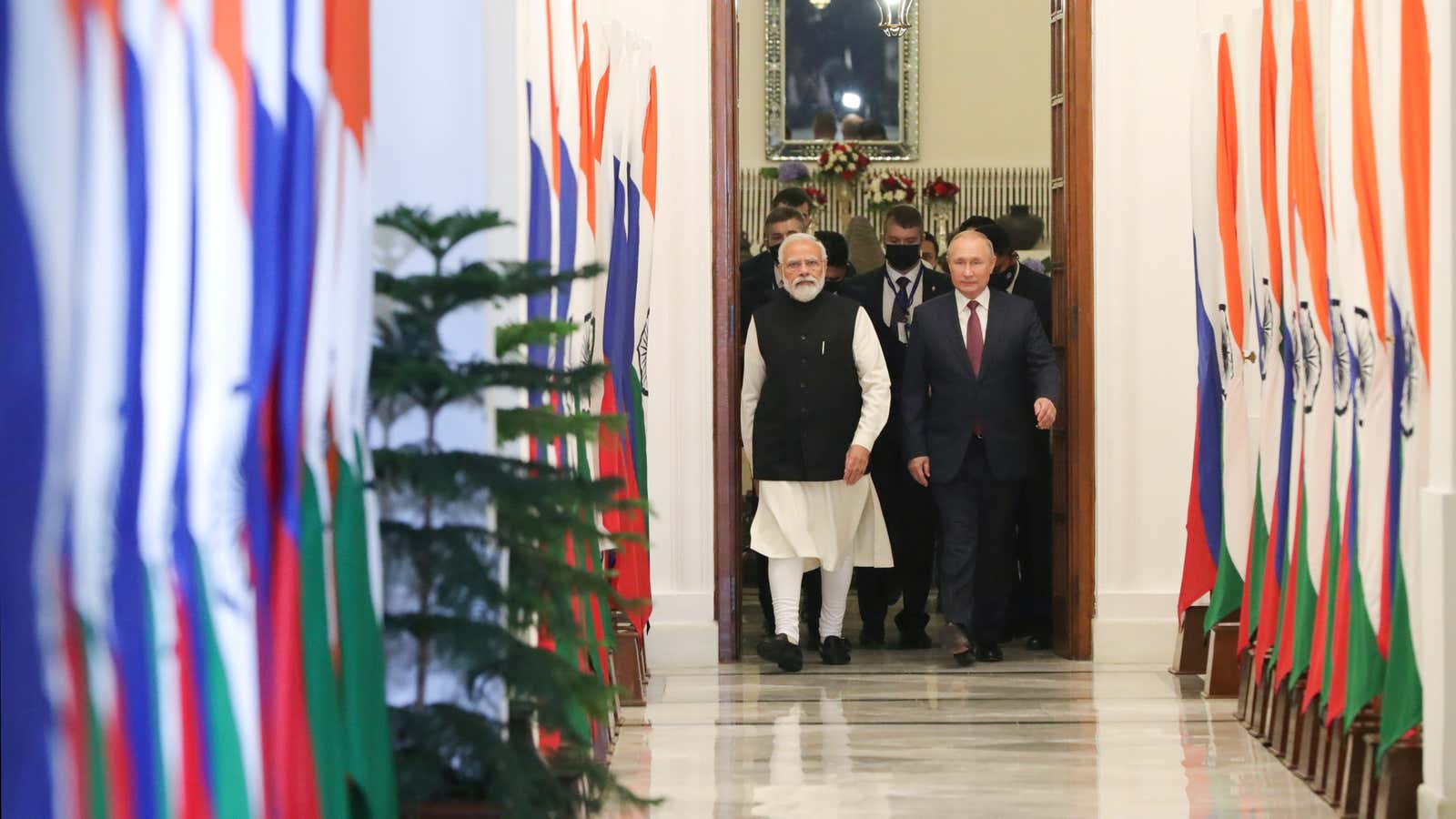While many Western commentators have criticised the Indian government for not opposing Russia’s invasion of Ukraine, many Indians on the internet have expressed support for New Delhi’s position.
They have offered a variety of reasons for doing so, ranging from India’s current dependence on Russia for military equipment to memories of the Soviet Union helping India during the 1971 war of liberation in Bangladesh.
While New Delhi has not said anything explicitly to support either side, its conduct is seen to have favoured Russia. On Saturday, it abstained from voting on a United Nations Security Council resolution condemning Russian aggression.
The next day it abstained again: this time on a United Nations Security Council resolution that called for an emergency session of the United Nations General Assembly to discuss Russia’s invasion of Ukraine.
As a result, Ukraine has been “dissatisfied” with India’s response. Russia, on the other hand, has praised India’s “independent and balanced” position.
Russian military hardware
Several considerations are shaping Delhi’s support for Russian President Vladimir Putin: India’s strong reliance on Russia for military equipment, historical ties with the USSR, and the threat of China getting closer to Russia.
The most prominent of these is India’s dependence on Russian arms. Tanvi Madan, a senior fellow in the Foreign Policy programme at the Brookings Institution, estimated that as much as 50%-80% of India’s military equipment is from Russia.
At present, India is awaiting the delivery of s-400 missile systems from Russia, which could be crucial for protecting its borders.
The need for these weapons has become even more crucial given that India’s border disputes with China have escalated in recent years alongside the constant tensions with Pakistan.
As a result, India would not want to antagonise Russia and push it closer towards China and Pakistan, neither of which have openly condemned the Russian attack either.
Long friendship
The long history of India-Russia ties is also driving Indian sentiment in favour of the Indian government’s position. New Delhi and Moscow have shared a strong friendship over the years, a relationship that started with along with Russia’s parent state, the Union of Soviet Socialist Republics.
The USSR had played a critical role in supporting India during the 1971 India-Pakistan war. The US, on the other hand, had backed Pakistan at the time and opposed the liberation of Bangladesh.
This has emerged as a strong point for pro-Russian sentiment seen online: by Twitter users, commentators, and even businessmen. One user tweeted that the story from 1971 is “a simple story of showing up for a friend”. Another user contrasted this with an incident in 1998 where Ukraine had voted against India for conducting a nuclear tests.
Racial discrimination
Currently, thousands of Indian students are stranded in Ukraine. Allegations that Ukrainian authorities are mistreating them and other non-White residents is another factor determining Indian sentiment.
After India and other countries abstained from voting at the United Nations, the Ukrainian ambassador to the United Nations Security Council had said that they should have voted to end the war for the safety of their nationals. Some Twitter users have viewed this as a veiled threat against Indian students.
Different strands converging
In a rare overlap, the foreign policy stance taken by the present right-wing Bharatiya Janata Party government is similar to the left-wing Communist Party of India (Marxist). This also shows the strong support that the Indian government’s position on Russia has received across party lines.
The Communist Party of India (Marxist) has asked for “an immediate cessation of armed hostilities and the establishment of peace” and said that the Russian military action is “unfortunate”. However, it recognised that the “Russian demand for security guarantees, including Ukraine not joining NATO, is legitimate”, backing Putin’s own justification for the war.
Alongside this positive statement from the Communist Party of India (Marxist) were posters in support of Russia put up in Delhi by an organisation calling itself the Hindu Sena. These sentiments have been echoed by BJP members on social media.
Response to Western condemnation
But some commentators from countries such as the US and UK have criticised the Indian government’s stance in the crisis.
They have said that such a position does not augur well, given New Delhi’s ambitions to become a superpower. Richard Haass, president of Council of Foreign Relations said that India’s response shows that “it remains unprepared to step up to major power responsibilities or be a dependable partner”. Robbery Shrimsley, editor at Financial Times echoed this sentiment.
However, there has been pushback from Indian Twitter users against this criticism as well. For instance, many Twitter users and even diplomats are pointing to the misdeeds of western countries such the US and questioning its legitimacy in asking other countries to condemn Russia.
Domestic criticism
However, not all domestic groups have taken a favourable view of India’s policy towards Russia.
Critics have said that New Delhi must denounce Russia for breaching the territorial sovereignty of another nation.
Two Congress leaders Shashi Tharoor and Manish Tewari have asked the Indian government to condemn Moscow’s actions, even though the Congress has not taken a party line on the issue. Tharoor said that Russia’s action was in violation of international law. He said that if China marches into India one day, New Delhi would want other nations to stand up.
Tewari had tweeted that he wished India stood with Ukrainians against this “unprecedented & unjustified aggression”.
“‘Friends’ need to be told when they are wrong,” he wrote.
One foreign policy commentator questioned India’s role in the United Nations Security Council, saying it did not even make a statement against Russia even though students’ lives and oil supplies were at stake.
This article first appeared on Scroll.in. We welcome your comments at ideas.india@qz.com.
